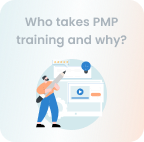







 10 Sep 2024
10 Sep 2024



Do you ever get amused thinking about the difference between PMP® vs PMI ®? You're not the only one! Understanding these terms clearly is important if you are interested in taking up a career in Project Management. Project Management Professional (PMP) ® is a globally recognized certification, while Project Management Institute (PMI) ® is the organization that makes it all happen.
In this blog, we discuss "PMP vs PMI" and get a clear idea of their differences, costs, eligibility criteria, and more. Whether you are looking to climb ladder in your career or just at the beginning stage in your life, this blog helps you choose the best path forward for your career. Let’s begin!
Table of Contents
1) What is PMI®?
2) What is PMP® Certification?
3) Differences Between PMP and PMI
a) Origin
b) Cost
c) Eligibility Criteria
d) Examination Detail
e) Reasons to Pursue
f) Advantages
4) Conclusion
PMI® is a global non-profit organization that offers education, professional certification, and professional standards for Project Management.
Key points about PMI®:
1) Focus Areas:
a) Offers education and professional certification.
b) Sets professional standards in project management.
2) Established History:
a) Founded in 1969.
b) Has grown remarkably over time.
3) Organization:
a) Recognized as one of the leading organizations for project management certifications and tools.
4) Main Aim:
1) Helps professionals achieve their goals.
2) Advances careers through project management knowledge and skills.

The Project Management Professional (PMP®) Certification is one of PMI's most recognized credentials. It is thoughtfully created for Project Managers who have experience in leading and directing projects.
Key points about PMP:
a) Provided by PMI (Project Management Institute).
b) One of the most recognized and respected project management certifications worldwide.
c) Requires a combination of education and project management experience to qualify.
d) Candidates must pass a rigorous exam that tests their knowledge and skills in project management.
e) Enhances career opportunities, increases earning potential, and validates expertise in project management.
While PMP and PMI are closely related to one other, they are not the same. Here's a detail breakdown of the key differences:

1) Origin
PMI:
a) Full form: Project Management Institute.
b) Sets global standards for project management.
c) Provides various certifications and resources.
PMP:
a) Full form: Project Management Professional.
b) One of the certifications offered by PMI.
c) Recognized globally as a standard for project management expertise.
PMI Membership:
a) Requires an annual membership fee.
b) Provides access to resources like publications, research papers, and networking events.
c) Offers discounts on certification exams and other PMI services.
PMP Exam:
a) Exam fee is separate from the PMI membership fee.
b) PMI members receive a discount on the exam fee.
c) Non-members pay a higher fee for the exam.
PMI Membership:
a) Open to anyone interested in project management.
b) No specific eligibility requirements.
PMP Exam:
a) Requires a combination of education and professional project management experience.
3) Options include:
a) Four-year degree + 36 months of project management experience.
b) Diploma or equivalent + 60 months of project management experience.
PMI Certifications:
a) Offers various certifications like CAPM, PgMP, PMI-ACP, etc.
b) Each certification has its own exam format and content.
PMP Exam:
a) Consists of 180 questions.
b) Covers a wide range of project management topics.
c) Divided into three domains: People, Process, and Business Environment.
d) Tests knowledge of project management principles, best practices, and application in real-world scenarios.
PMI Membership:
a) Access to a wealth of resources, including publications, research, and networking opportunities.
b) Helps stay updated with trends and best practices in project management.
c) Provides opportunities for continuous learning and professional development.
PMP Certification:
a) Validates expertise in project management.
b) Enhances competitiveness in the job market.
c) Leads to higher earning potential and career growth.
d) Enables working on more complex and challenging projects.
PMI Membership:
a) Offers continuous learning through webinars, seminars, and local chapter events.
b) Provides opportunities for professional development and networking.
c) Access to exclusive PMI publications and research.
PMP Certification:
a) Globally recognized credential.
b) Facilitates job opportunities across different countries and industries.
c) Enhances credibility and professional reputation.
d) Increases chances of promotion to leadership roles.
PMP® vs PMI® are very important parts of the Project Management profession. PMI provides the framework, resources, and certifications to help professionals succeed in Project Management. PMP is a specific certification that validates a Project Manager's skills and knowledge. Whether you choose to become a PMI member or pursue PMP certification, both offer notable benefits that can boost your career.






© Copyright 2017. All rights reserved. Contact: PMP® TRAINING ACADEMY.
